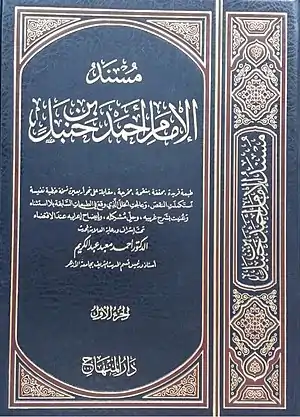Musnad Ahmad ibn Hanbal
Musnad Ahmad ibn Hanbal (Arabic: مسند أحمد بن حنبل) is a collection of musnad hadith compiled by the Islamic scholar Ahmad ibn Hanbal (d. 241 AH/855 AD) to whom the Hanbali fiqh (legislation) is attributed.[1]
 Front cover of Musnad Imam Ahmad Ibn Hanbal. | |
| Author | Ahmad ibn Hanbal |
|---|---|
| Country | Abbasid caliphate |
| Language | Arabic |
| Genre | Hadith collection |
| Part of a series on |
| Hadith |
|---|
|
|
Description
It is one of the largest hadith books in Islamic history containing more than twenty-seven thousand hadiths, according to Maktaba Shamila.[2] It is organized into compilations of the hadiths narrated by each companion, starting with "the ten who were promised Paradise". This highlights their status and the efforts they made to preserve the ahadith of Muhammad.[3]
It is said by some that Ahmad ibn Hanbal made a comment in regard to his book which reads as follows: "I have only included a hadith in this book if it had been used as evidence by some of the scholars." Abu al-Faraj Ibn al-Jawzi ironically claimed that the Musnad contains hadiths that are fabricated by interpolation (i.e. the narrator jumbling up information, mixing texts and authoritative chains), which were said to be nine Hadiths by some, or fifteen hadiths by others. However, it is agreed that the hadith that are suspected to be fabricated are not new hadiths that are creations of a dubious narrator's imagination.[4]
Publications
The book has been published by many organizations around the world, including:
See also
Notes
The Internet Archive hosts a copy of Musnad Ahmad Volume 4 in English at https://archive.org/details/musnadahmadvol.4final.
References
- Brown, Jonathan A.C. (2014). Misquoting Muhammad: The Challenge and Choices of Interpreting the Prophet's Legacy. Oneworld Publications. p. 41. ISBN 978-1780744209.
- "مسند أحمد ت شاكر • الموقع الرسمي للمكتبة الشاملة".
- "Musnad Imam Ahmad Bin Hanbal (3 vol)". www.islamguide.dk. Retrieved Apr 30, 2019.
- Fatawa of Ibn Taimiya, vol 1, page 248.
- Musnad Imam Ahmad Bin Muhammad Bin Hanbal: Codification According to the Subject Heading - Volume 2 (Hardcover). 2004. ISBN 9780963206749. Retrieved Apr 30, 2019.
{{cite book}}:|website=ignored (help) - "MUSNAD IMAM AHMAD BIN HANBAL VOL.4 (Hadith 4377-6030),9786035003896". Retrieved May 5, 2020.
- English Translation of Musnad Imam Ahmad Bin Hanbal Vol 5 (Hadith 6031-7624),9786035004282. Retrieved May 5, 2020.
External links
- Methodology of Imam Ahmad (Arabic)